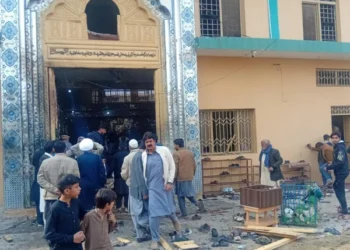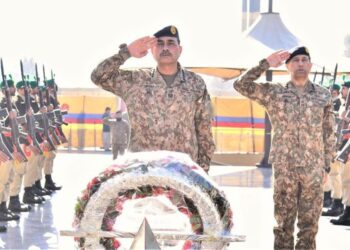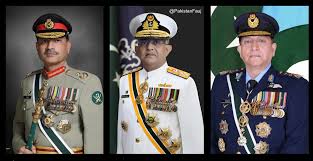Turbat, Balochistan – Field Marshal Syed Asim Munir, Chief of Army Staff (COAS) of Pakistan, undertook a significant visit to Turbat in the province of Balochistan, where he reviewed the security situation, ongoing development projects, and civil-military cooperation measures aimed at bringing long-term stability to the region.
According to a statement released by the Inter-Services Public Relations (ISPR), the Army Chief was given a comprehensive briefing on the prevailing security dynamics, progress in counterterrorism operations against elements labeled “Fitna-ul-Hindustan”, and the scope of socio-economic initiatives being carried out to improve the lives of the people of Balochistan.
Strategic Importance of Turbat and Balochistan
Turbat, the second-largest city of Balochistan after Quetta, holds immense strategic importance due to its proximity to the Gwadar Port, a central hub of the China-Pakistan Economic Corridor (CPEC). The region has historically faced challenges such as terrorist activity, separatist movements, and underdevelopment, which makes security operations and governance reforms crucial for stability.
Field Marshal Asim Munir’s visit reflects the Pakistan Army’s focus on Balochistan as a cornerstone of national development and regional connectivity. By reviewing both security and developmental aspects, the Army Chief signaled that a dual approach—combining peace enforcement with economic progress—is essential for lasting prosperity in the province.
Briefing on Security Dynamics and Counterterrorism Efforts
During his visit, the Army Chief received detailed updates on the evolving security landscape in Balochistan. The briefing emphasized the success of operations conducted against hostile elements described as Fitna-ul-Hindustan, a term used by the military to identify groups allegedly backed by external forces seeking to destabilize Pakistan.
The Army Chief was informed that intelligence-based operations and targeted security measures have yielded significant successes in dismantling militant networks, curbing cross-border infiltration, and restoring a sense of safety among local populations. These operations were described as vital in protecting major infrastructure projects and ensuring the secure implementation of development plans under CPEC.
Focus on Good Governance and Public Participation
In his meeting with the civil administration, which included Chief Minister Balochistan Sarfaraz Bugti, the Chief Secretary, and other senior officials, Field Marshal Asim Munir stressed the need for good governance and public participation as pillars of sustainable development.
He highlighted that while the Army continues to provide security, it is equally essential for the civil administration to engage directly with local communities. He emphasized transparency, accountability, and inclusivity, calling on public representatives to ensure that development projects reach the grassroots level and address the real needs of the people.
This call for governance reforms reflects a broader national understanding that security gains must be consolidated through socio-economic initiatives that empower local citizens and reduce grievances that militants exploit.
Development Projects and Socio-Economic Improvement
The Army Chief was also briefed on the range of development projects underway in Balochistan, particularly those focusing on:
- Infrastructure building – Roads, schools, and health centers in Turbat and surrounding districts.
- Energy projects – Initiatives designed to reduce electricity shortages in remote areas.
- Youth development – Programs to increase access to education, skills training, and employment opportunities.
- Healthcare improvements – Establishment of medical facilities and mobile health units for underserved populations.
The ISPR statement highlighted that these projects are designed to integrate Balochistan more fully into the national economy and reduce regional disparities. By creating new jobs and services, the initiatives aim to address longstanding complaints of neglect and marginalization.
Importance of Joint Civil-Military Cooperation
One of the key themes of the Army Chief’s visit was the importance of joint civil-military measures in driving development and maintaining peace. Field Marshal Munir reiterated that stability cannot be achieved through military operations alone. Instead, a coordinated effort between the army, civil administration, and local communities is essential.
He underlined that Pakistan’s progress depends on strengthening national unity and bridging trust deficits, particularly in provinces like Balochistan that have historically faced alienation. The emphasis on cooperation highlights the Army’s commitment not only to security but also to fostering socio-political harmony.
Commitment to Balochistan’s Prosperity
Field Marshal Asim Munir reaffirmed the Pakistan Army’s unwavering commitment to the prosperity, stability, and sustainable development of Balochistan. He stated that the Army stands shoulder-to-shoulder with the people of the province and will continue to support initiatives that promote peace, education, healthcare, and employment.
This assurance comes at a time when the federal and provincial governments are striving to address decades of neglect in Balochistan, where poverty rates are high despite the province’s rich natural resources. The Army Chief’s message served as both a reassurance to the people of Balochistan and a signal of continuity in state policies aimed at regional uplift.
Interaction with Soldiers and Troops
During his stay, the Army Chief also addressed soldiers stationed in Turbat and neighboring areas. He praised their high morale, operational readiness, and sacrifices in maintaining peace in one of the most challenging regions of the country.
Field Marshal Munir acknowledged the courage and resilience of the armed forces, noting that their dedication has been instrumental in establishing peace and enabling development activities. He reminded the soldiers that their role goes beyond combat, extending to the broader mission of supporting the nation’s progress.
Warm Welcome and Symbolic Importance
On his arrival in Turbat, Field Marshal Syed Asim Munir was warmly welcomed by the Corps Commander Balochistan and other senior officials. The reception underscored the symbolic importance of his visit, which not only boosted the morale of the troops but also reinforced the message of solidarity with the people of Balochistan.
Such high-profile visits carry strong symbolic weight, as they demonstrate the Army leadership’s direct engagement with both soldiers and civilians in the province.
Broader Context: Challenges and Opportunities in Balochistan
The visit comes against the backdrop of multiple challenges facing Balochistan:
- Security threats from insurgent groups and external actors.
- Economic disparities compared to other provinces.
- Infrastructure gaps, particularly in education and healthcare.
- Trust deficits between local communities and state institutions.
However, there are also growing opportunities. With CPEC projects progressing, Gwadar emerging as a trade hub, and renewed focus from both civil and military leadership, Balochistan is positioned to play a central role in Pakistan’s economic future.
The Army Chief’s tour of Turbat reflects an effort to align security priorities with development goals, ensuring that the province becomes a cornerstone of regional prosperity rather than a flashpoint for unrest.
Conclusion
Field Marshal Asim Munir’s visit to Turbat, Balochistan, was more than a routine military tour—it was a comprehensive review of security, governance, and development measures in one of Pakistan’s most strategically vital regions.
By emphasizing counterterrorism successes, governance reforms, civil-military cooperation, and socio-economic uplift, the Army Chief signaled a holistic vision for Balochistan’s future. His interaction with soldiers reinforced the military’s commitment to security, while his meetings with civil officials highlighted the importance of governance and public participation.
As Pakistan seeks to overcome its internal challenges and harness its geo-economic potential, Balochistan remains central to this vision. The Army Chief’s visit reaffirmed that the province’s stability and prosperity are not just regional priorities but a national imperative.

























